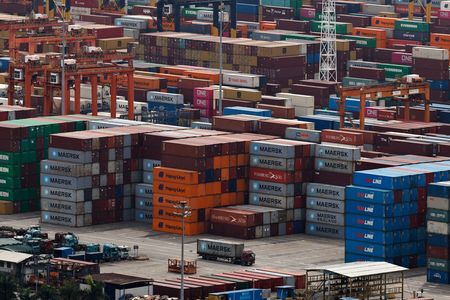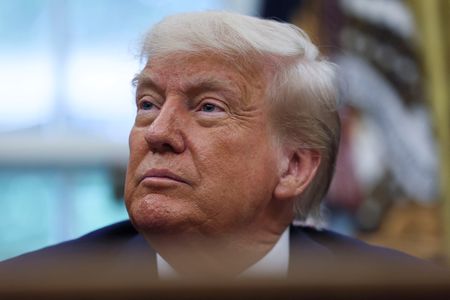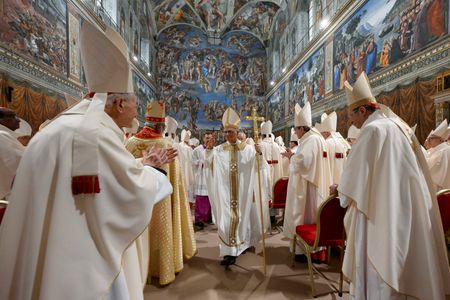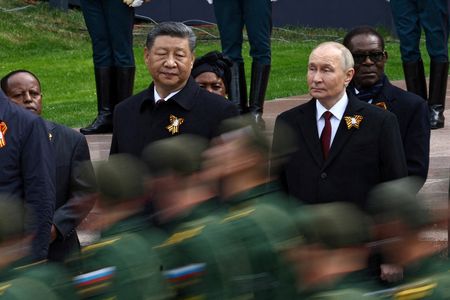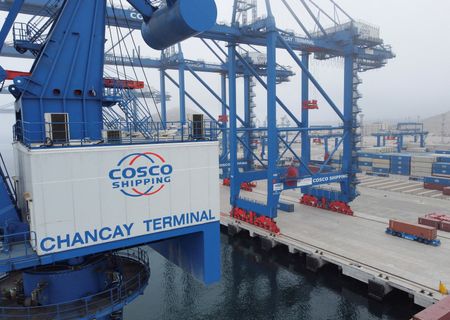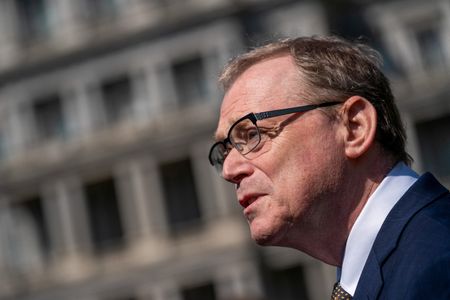By Doina Chiacu
(Reuters) -U.S. President Donald Trump said on Friday an 80% tariff on Chinese goods “seems right,” for the first time suggesting a specific alternative to the 145% levies he has imposed on Chinese imports ahead of closely watched weekend talks.
U.S. Treasury Secretary Scott Bessent and chief trade negotiator Jamieson Greer will meet Chinese economic tsar He Lifeng in Switzerland for talks aimed at containing a trade war between the world’s two biggest economies.
It could be the first step toward resolving a damaging trade conflict that has already entangled global supply chains.
Asked how the U.S. president came to the 80% figure, White House spokeswoman Karoline Leavitt said, “That was a number the president threw out there, and we’ll see what happens this weekend.”
Trump will not unilaterally bring down tariffs on China, however, she stressed. “We need to see concessions from them as well.”
China is also sending a top public-security official to the talks in Geneva, a source familiar with the plans said. The development, first reported by the Wall Street Journal, is an indication of the importance of the issue of fentanyl trafficking to the talks and the wider U.S.-China relationship.
Trump has linked the two issues, using the fentanyl scourge as the rationale for the initial imposition of punitive import taxes on goods from China, Canada and Mexico earlier this year.
China’s embassy in Washington did not respond immediately to a request for comment.
“China should open up its market to USA – would be so good for them!!! Closed markets don’t work anymore!!!” Trump wrote in an all-caps social media post. “80% tariff on China seems right. Up to Scott B.,” he added moments later.
China’s foreign ministry has decried what it calls abusive and bullying economic tactics, and said that China remains firmly opposed to what it calls an unsustainable approach to trade by the U.S.
While Trump has indicated on several recent occasions that he expects the punitive tariff rates he has imposed on China to come down, he had not until now floated a potential figure for where they might fall to.
Even though 80% is just around half the current rate, it remains extraordinarily high and is above even the hefty 60% rate that Trump had said he would impose during his campaign for president last year. It was not clear how well it would be received by China amid what Bessent has already cast as an effective trade embargo between the two countries.
What level tariff rates settle at – and not just for China – has been a central focus for investors rattled by months of financial market volatility arising from the chaotic rollout of Trump’s aggressive trade policies.
STOCKS SLIP AFTER TRUMP REMARKS
U.S. stocks, which have recouped a significant chunk of their losses since mid-February’s record high, were modestly lower on Friday after Trump’s social media post. The dollar was weaker against a basket of major trading partners’ currencies.
Since taking office in January, Trump has hiked the tariffs paid by U.S. importers for goods from China to 145%, in addition to those he imposed on many Chinese goods during his first term and the duties levied by the Biden administration.
China hit back by imposing export curbs on some rare earth elements, vital for U.S. manufacturers of weapons and electronic consumer goods, and raising tariffs on U.S. goods to 125%. It also imposed extra levies on some products including soybeans and liquefied natural gas.
The weekend talks in Geneva have been described by Trump administration officials as a step towards de-escalating tensions with China. White House economic adviser Kevin Hassett, director of the National Economic Council, said the meeting seemed “very promising” to U.S. officials.
“We’re seeing extreme respect, treating both sides with respect,” Hassett said in an interview with CNBC. “We’re seeing collegiality and also sketches of positive developments.”
Trump’s push on tariffs is widely seen to be elevating risks to the U.S. economy, with concerns that they will lift prices for American consumers and businesses and rekindle inflation while at the same time cutting into the demand that has so far propped up the job market.
Indeed, Trump is already facing dropping approval ratings over his handling of trade as Americans brace to pay more for clothes, electronics, toys and countless other goods that emerge from Chinese factories.
China’s government is seeking to mitigate closures, bankruptcies and job losses at manufacturers who are struggling to find viable alternatives to the U.S. market.
Representing the meeting’s host, Swiss Vice President Guy Parmelin, who also serves as economic minister, emerged from separate bilateral meetings in Geneva with the U.S. and Chinese delegations with optimistic words for reporters.
“It’s already a success,” Parmelin said. “The two sides are talking … If a road map can emerge and they decide to continue discussions, that will lower the tensions.”
“We could imagine everything – we could imagine a mutual suspension of customs duties during the course of the discussions,” Parmelin added, noting they could extend into Sunday or even Monday. “That’s up to the parties.”
(Reporting by Doina Chiacu and Jeff Mason in Washington; additional reporting by Emma Farge in Geneva and Antoni Slodkowski in Beijing; writing by Doina Chiacu and Jonathan Allen; editing by Philippa Fletcher, Andrea Ricci, Mark Heinrich and Diane Craft)

